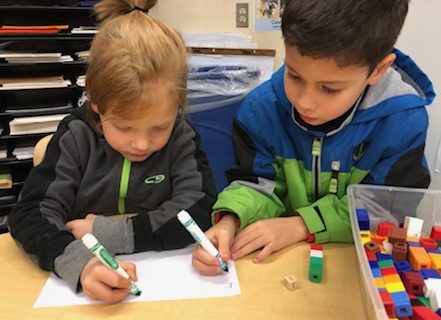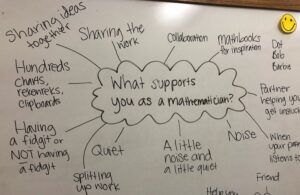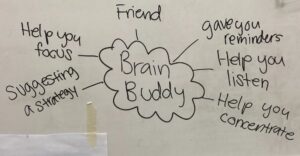Valuing differences through Brain Buddy work

As a primary team, we have organized our intentions for the school year around the idea of the “We that I am.” One of our big questions within this frame is:
What does it mean to belong to a community that recognizes and values differences?
Recently, first grade math paused from the counting work we have been so focused on to wonder about ourselves as mathematicians in collaboration. I was curious what the children were noticing about work in partnerships, what they might identify as needs for themselves, and larger needs for our math community as a whole.
We began by wondering together about what supports us as mathematicians. Each child shared what they know about themselves and the conditions, tools, and strategies that support their concentration, growth of ideas, and collaboration with others. Very early on in our sharing, it became apparent that many of us needed different things! For example, some children shared that having something to fidget with during group conversations helps them to focus and relax their bodies. Other children identified that fidgets have distracted them in the past and that they struggle to listen because they become absorbed in the fidget. Some children said that they work best in completely quiet spaces, while others like a bit of noise in the background. Abigail added, “You know how sometimes at coffee places there are people working on their computers with headphones in their ears? I think that helps me too. Some noise in my head but not so much noise that I can’t think.”
To my surprise, we had stumbled upon our big question very quickly! I normalized how often communities discover that individual members need different things and that it becomes the responsibility of the community to figure out how to support its members. It was exciting that we had encountered this tangle because we have the opportunity to recognize each other’s differences and the values that those differences bring to our community and then decide how to move forward in a way that honors us all as individuals and as a whole.

As we had this conversation, I became increasingly curious about our partner work. Specifically, I noticed that children who had shared that they were needing certain things to support them as mathematicians were often working with partners who needed something different. I wondered if those relationships might be places for us to start meeting individual needs. I asked the children to crack open the term “Brain Buddy,” a common phrase at Opal School that describes children who support each other’s thinking.
One of the strongest realizations that we had during this discussion was that although a Brain Buddy might be a friend, it also might be someone who you do not normally play with. Many of the children said that the friends they play with during free times were people they enjoyed being silly with and that it can be hard not to be silly with these friends in partner work. William shared, “I like the ‘be silly’, but when I’m silly I can’t think about math.” We continued to identify things that a Brain Buddy might do that would feel supportive. Then I asked the children to take a silent two minutes to look around our classroom at their community members and reflect on each person. Is this person a strong Brain Buddy for me? How do I know? Are there people who I have not worked with very often that I might like to learn more about?
Afterwards, the children wrote at least two names down on a post-it note of people they felt were strong Brain Buddies for them or that they felt unsure about and wanted to try out as a Brain Buddy. We then played a familiar math game with the intention of practicing what it feels like to work with a Brain Buddy and be a Brain Buddy ourselves.

As a teacher-researcher, this experience was a reminder of the importance of keeping my questions and intentions in mind and holding a strong image of the child. Prior to having this conversation, there were many instances where I felt frustrated. Partnerships were feeling increasingly hard and I was unsure of what needed to change in order for partner work to support us as individuals and as a community. Through reflecting on what I knew to be true of these children, I knew that they also wanted their partnerships to feel good and that they held the potential to uncover what they needed for this to be true. I was uncertain where our conversation might lead us and I knew that I trusted that the children could dive into a deep and productive reflection with me.
As we move forward as a community, I am certain there will be many more opportunities for us to pause and revisit what supports us as individuals and as a whole.
I am wondering:
-What pauses have you taken as a classroom community to reflect when something is feeling hard?
-What needs do the children identify when they have the opportunity to wonder about these things with you?
-How does your classroom community support the individual and the whole?
